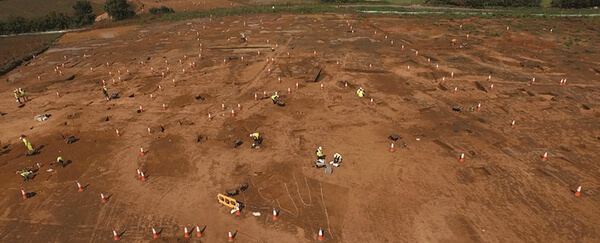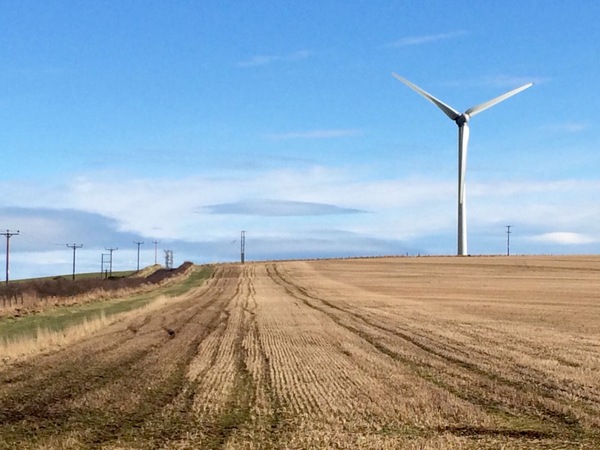News Release from windfair.net
Wind Industry Profile of
Dig First, Build Later
One of the largest archaeological excavations in Europe this year has revealed a rich collection of information about the history of Suffolk on the east coast of England from Roman, Anglo-Saxon and medieval times.
The project was commissioned by energy utility and wind farm developer ScottishPower Renewables. The company is currently building one of the world's largest offshore wind farms off the coast of England, East Anglia ONE, which will supply 500,000 households with clean energy in the future. The construction also includes the laying of a 37-kilometer cable that will connect the wind farm to the national electricity grid.
The cable, connected to a converter station in Bramford, will be laid underground – and since there have been archaeological finds in the area in the past, ScottishPower financed archaeological investigations in a 60 ha area in Suffolk.
Up to 400 archaeologists have been involved in the work since February this year. At peak times, around 250 employees dug up objects on site while 20 members of the Ipswich and District Metal Detector Club were also involved. The excavation has yielded new insights into previous settlements and land use activities in the region. Evidence from the Bronze Age, Iron Age, Roman Age, Anglo-Saxon and Middle Ages has been found.

In addition to residential dwellings and places of work, a wide range of pottery fragments have been discovered alongside tools and coins and other pieces of interest. (Image: ScottishPower Renewables)
Joanna Young, Stakeholder Manager at ScottishPower Renewables, comments on the findings: “Hundreds of archaeologists and metal detectorists combing over fields in Suffolk is not the first thing you think of when you imagine an offshore windfarm - but it highlights the wide range of efforts needed to build a major energy project like ours.“
Richard Newman, Post-Excavation Manager, confirms the importance of the work: “It is not often that archaeologists get access to such a vast corridor of land, and the project has been fascinating. All of the finds will now be analysed further, and detailed reports will be produced, but it is safe to say we already know a lot more about Suffolk’s history today than we did a year ago.”
The archaeologists are often faced with a dilemma though: the excavation sites are irretrievably destroyed when wind farms are built or cables laid on site. On the other hand, some of the sites would not have been made accessible at all if they had not been brought into the focus of today's energy industry.
„Of course, my archaeologist's heart is bleeding at this moment," explains Dr. Andreas Thiedmann from the State Office for Monument Conservation of Hessen, Germany, to local newspaper Lauterbacher Anzeiger. "Because here a 4,500-year-old cultural monument is to be replaced by a commercial complex." This is why a hill grave is being professionally excavated and documented by a team of archaeologists on the Steinberg in the Angersbach district in central Germany. A wind farm with five turbines will be built on the site. The excavations are financed by HessenEnergie, the future operator of the wind farm.
What is hidden in the ground beneath the wind turbines? (Picture: Katrin Radtke)
In Germany, the Office for the Protection of Historical Monuments is responsible for such work. As this is Federal States matter, there are 16 different laws for the protection of historical monuments in Germany with its 16 federal states. And all the laws differ in varies aspects. In many of these states, however, the so-called 'polluter-pays-principle‘ applies, which states that the costs of archaeological work must be borne by the person responsible for the construction activities that damage or destroy a monument, as the German Society for Prehistory and Early History (DGUF) explains.
There's another case in Lower Saxony, where a team of archaeologists worked last year in the run-up to the construction of a wind farm between Lübberstedt and Hambergen in north Germany. According to newspaper Osterholzer Kreisblatt, the district had already drawn attention to the fact that records of possible archaeological finds in the area were available during the approval procedure for the wind farm, so wpd onshore GmbH had to let the archaeologists work on the site first. The company also had to finance their work in the run-up to the construction work.
In Germany, however, such excavations are increasingly rarely carried out. On the one hand, there is a lack of financial resources for this, and on the other, there aren't sufficient human resources. There are more and more construction projects in areas that are difficult to access with fewer and fewer specialists. A vicious circle. It has to be carefully considered in advance whether it is really worthwhile to send the archaeologists into the field.
The aspect of learning from the past is particularly important though. Today's modern wind energy is also based on windmills from earlier times.
- Author:
- Katrin Radtke
- Email:
- press@windfair.net
- Keywords:
- wind energy, archeology, excavation, polluter pay principle, wpd, ScottishPower Renewables










